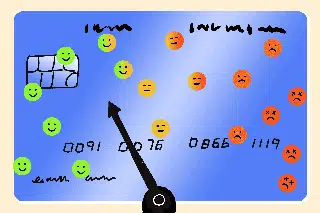So You Got an Automatic Credit Limit Increase. Is That a Good Thing?

Money recently launched Dollar Scholar, a new personal finance newsletter written by a 27-year-old who’s still figuring it out: me.
Every week, I’ll talk to experts about a money question I have, whether that’s “Are online banks sketchy? or “How many credit cards do I need?” As I learn, I’ll share simple ways to improve your financial life… and post some funny memes.
This is (part of) the sixth issue. Check it out below, then subscribe to get future editions of Dollar Scholar every Wednesday.
Here is a short list of things I know a lot about: Yorkshire terriers, Renaissance art, young adult literature, Vine compilations, millennial voters, mid-2000s teen TV shows, memes and the Elvis-is-alive conspiracy theory. Here is a shorter list of things I do NOT know a lot about: credit.
Despite my best efforts, I'm still learning the ins and outs of it. For example, I've previously written about my credit score, but I'm a little confused about how the credit bureaus work and what makes an inquiry hard or soft.
So I had no insight when a friend recently asked me for advice about her credit limit. What is a credit limit, anyway? How do I get a higher one? Wait, should I get a higher one?
Rod Griffin, director of consumer education and awareness for Experian, got on the phone to walk me through the basics. He said credit limits are what they sound like: They refer to the maximum amount a person can charge on a card. The credit card company sets the limit; the customer has to follow it.
Unfortunately for my eyeliner and black nail polish, there's not really room for rebelling. If I go over the limit, Griffin said either my purchase will be declined or I'll have to pay an (ingeniously named) over-the-limit fee.
There's actually an interesting federal law involved here. The Credit CARD Act of 2009 — we're killing it with the names, you guys — only just put restrictions on how much companies could charge for going over the limit. It also made it so customers had to opt in to over-limit coverage.
President Barack Obama signed the act into law, and it apparently had its intended effect: The Consumer Financial Protection Bureau found in 2015 that the law had helped people avoid some $9 billion in over-limit fees.
Thanks, Obama. (Really.)
That doesn't mean it's OK to spend recklessly, though. As Griffin says, "There are a lot of things to be aware of when it comes to credit limits and your credit overall."
One of the factors that influences a person's credit score is their utilization rate, which is calculated by dividing how much credit you're using by how much credit you have. Griffin said your utilization rate should always be less than 30% — AKA, it should stay far, far away from your limit.
It is possible to get your credit limit raised, in turn lowering your utilization rate and theoretically boosting your score. In fact, Griffin said it often happens automatically. I checked and sure enough, my credit limit has been increased twice since 2016 without me asking. Sweet.
You can also request to have your limit raised — sometimes it's as easy as clicking a button on your card company's website. But it's not always a good thing. Griffin said it could be treated as a hard inquiry on your credit report, which could in turn hurt your score. Plus, it could enable bad spending habits.
"The challenge comes when a person is asking to increase their credit limit because they're maxing out their credit cards, because they're misusing them," he says. "They're charging to the maximum consistently and looking for a way around reducing their debts."
If you have a case like this, Griffin said it might be better to focus your efforts on making payments to decrease your balance than asking for a credit limit increase.
What's a scenario in which it would make sense for a person to ask for a credit limit increase? If you regularly put your card down for business expenses and find yourself nearing the limit while waiting to get reimbursed, it might be a smart move.